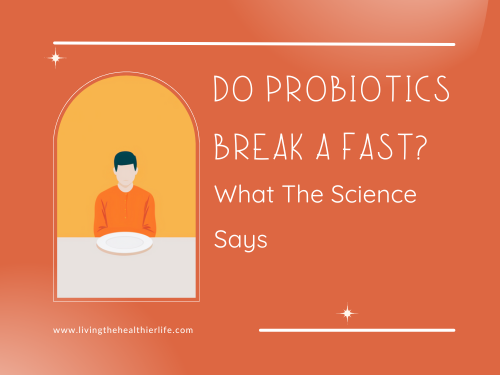Do probiotics break a fast? It’s a question that might make you pause as you stir your morning black coffee. The truth is that most dieting and health regimes are a balance – a complex dance between competing demands, and sometimes that spills over into confusion about what you should and should not do. If you’re navigating the intricacies of intermittent fasting, you’re likely curious about improving your gut health without interrupting your fasting state. In this article, we’ll debunk the myths, introduce the science, and provide clarity on how to effectively integrate probiotics into your fasting routine, ensuring you maximize both the gut health benefits and your fasting goals.
Disclaimer: This article contains affiliate links, which means we receive compensation if you buy after clicking on our links.

Understanding Probiotics
Probiotics might seem like just another health buzzword, but in reality, they’re beneficial live microorganisms. When included as part of a balanced diet, they play a crucial role in maintaining our gut health and improving our digestive system. You can find these good bacteria in foods like yogurt, kefir, and sauerkraut. Naturally, if you’re following a fasting protocol or a weight loss regime, you might wonder about the impact of eating these foods. Do the benefits of probiotics outweigh any potential disruption to a fasting period?
The Concept of Fasting and Its Effects
Let’s now examine fasting. We’ll explain what it is and how intermittent and extended fasting impact gut health.
What Is Fasting?
Fasting has been embraced in various cultures and health circles for its numerous health benefits. This practice typically involves designated periods of eating and fasting, known as the eating window and fasting window, respectively. During periods of fasting windows, no calories are consumed, which prompts the body to make several physiological adjustments. Notably, insulin levels drop, which can enhance insulin sensitivity. This process also shifts how the body uses energy, typically increasing fat breakdown for fuel. These initial changes set the stage for deeper exploration into how specific interventions, like taking probiotic supplements or foods, might fit into this dietary pattern.
Intermittent Fasting and the Impact on the Gut
Intermittent fasting impacts the gut by alternating between periods of eating and non-eating, which may reset and enhance the gut microbiome’s balance. Reduced food intake during fasting periods decreases gut activity, which can diminish bloating and other digestive issues, fostering a healthier digestive tract environment. Over time, this may promote the growth of beneficial gut bacteria and decrease inflammation.
Extended Fasting and its Impact on the Gut
Extended fasting extends these benefits further by initiating more profound biological processes such as autophagy. This not only helps in clearing out damaged cells but also supports a stronger and more balanced gut flora, potentially reducing the risk of inflammatory bowel disease and other gut-related health issues. When reintroducing food after extended fasting, it’s essential to include nutrient-rich, probiotic-dense foods to support these positive changes in the gut environment.
What the Science Says About Probiotics During Fasting
Whether or not to include probiotics during fasting can cause some confusion because you’ll get mixed advice online from experts and dietitians. But let’s examine some of the scientific research that could help point us in the right direction.
Gut Microbiome During Fasting (The Journal of Nutrition and Metabolism)
Research, such as findings in the Journal of Nutrition and Metabolism, suggests that probiotics help maintain a healthy gut microbiome during fasting, potentially boosting metabolism. This is critical as fasting significantly alters the gut environment, which could enhance the benefits of probiotics for the immune system and help stabilize blood glucose levels. And the boost to metabolism could be vital if you are using fasting as a way to lose weight.
Probiotics and Inflammation (American Journal of Clinical Nutrition)
Further studies, like those published in the American Journal of Clinical Nutrition, indicate that probiotics may reduce the inflammation commonly associated with fasting, easing the physical stress on the body. This could be particularly beneficial for those concerned with cardiovascular disease or maintaining heart health, as inflammation is a known risk factor.
The Timing of Probiotics During a Fast
Despite these insights, the scientific community has not unified on the optimal timing for probiotic intake during fasting. Emerging research suggests that consuming them during your eating period may be most effective, as the presence of other foods might help shield the probiotics through the acidic journey in the stomach. After a fast when your stomach is empty, it acts as the perfect receptive environment for gut-friendly foods.
Probiotics and Breaking a Fasted State
Additionally, it’s essential to understand that consuming any food or drink with calories, such as protein supplements or bone broth, during the fasting window can interrupt the fasted state. This interruption shifts the body out of ketosis, where fat loss is maximized because the body burns fat for energy in the absence of glucose. This knowledge is vital for anyone using fasting as a strategy for weight management or to improve metabolic health, reinforcing the importance of maintaining zero calories during fasting periods to achieve the full benefits of fasting.
It’s wise to consult a healthcare provider before integrating probiotics into your fasting routine. They can offer guidance tailored to your specific health conditions and fasting goals. Continuous research is likely to further clarify the best practices for probiotic supplementation during fasting.
Probiotics: Supplements Versus Food
Deciding between probiotic supplements and food sources can really influence your fasting routine. Foods like yogurt, kefir, and sauerkraut are great for your gut and packed with other good stuff, but they do have calories. That means eating them during a fast could actually break it, taking your body out of the fasted state that’s so good for fat-burning and boosting insulin sensitivity.
On the flip side, probiotic supplements usually don’t have calories, so they won’t interrupt your fast. However, taking supplements on an empty stomach can be a double-edged sword. While it might seem like they’d be more effective without food in the way, some strains of probiotics might actually survive better if taken with a small amount of food to cushion their journey through the acidic stomach environment. Just make sure to check the labels. You will see a warning sign if a supplement isn’t to be taken on an empty stomach. Also, check the quality of the supplement and ingredients list for any sneaky extras that might add calories.
So, when it’s time to decide when and how to take your probiotics, think about what you’re aiming to achieve with your fasting plan. This way, you can enjoy the perks of probiotics without stepping away from your fasting goals.
Practical Tips for Incorporating Supplements Into a Fasting Regime
If fasting is a regular thing for you, then you need a strategy for incorporating probiotics in a way that optimizes the benefits of fasting – and the benefits to your gut health. Here are some practical tips to help you do that.
Choose the Right Timing
In an intermittent fasting plan, timing is everything. The best time to take probiotic supplements is just before your eating window opens, provided you can take supplements on an empty stomach. This allows the probiotics to enter your system when it’s more receptive, helping you maximize their benefits without disrupting your fast. If you want to stick to food, break your fast with a probiotic-rich snack like Greek yogurt.
Consider the Type of Probiotic
Different strains of probiotics may have different needs. Some strains might survive better if taken with a small meal, which can buffer the stomach’s acidity. Research the strains included in your supplement to optimize their survival and the benefits to your digestive health.
Add Probiotics To Your Diet
If you prefer getting your probiotics from food, aim to include probiotic-rich foods as part of your daily diet. This approach supports your digestive system every day, giving you a richer variety of nutrients and maintaining a healthy gut microbiome. So swap a bowl of porridge with a bowl of yogurt, nuts, and fruit, and add some sauerkraut to some side salad with your evening meal.
Consider Fiber Intake
Including prebiotic foods in your eating window can enhance the effects of probiotics. Foods like whole grains, bananas, and garlic provide the necessary fibers that feed beneficial bacteria, boosting their efficacy and supporting your overall health during periods of fasting.
By carefully considering when and how you introduce probiotics and prebiotics into your fasting routine, you can support your body’s needs without compromising the principles of your fasting schedule.
Do Probiotics Break A Fast? A Final Thought
So, do probiotics break a fast? It really comes down to how and when you take them. If you time it right and choose the right form, you can add probiotics to your routine without messing up your fast. Just remember, the key is to match your probiotic intake with your body’s needs and your fasting schedule. Keep things balanced, and you’ll take care of your gut health without skipping a beat in your fasting benefits. Here’s to making your fasting plan work smarter for you!
Pin This Post

